Stuart Jeanne Bramhall's Blog: The Most Revolutionary Act , page 1156
August 13, 2017
GMO Free: Russia to Become Top Producer of Organic Food
*
*
Russia aims to become world’s largest exporter of organic food.
U.S. Media Silent as Putin Declares Russia GMO-Free
By Eco News Media
Global Research, August 12, 2017
Eco News Media 31 July 2017
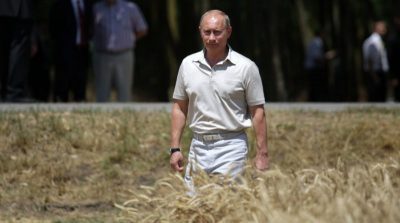
Most of you know that Russian President Putin has Russia saying “not yet” to GMOs and asserting their national focus on establishing themselves as the world’s largest exporter of organic food, as well as providing their people with healthy non-GMO food.
This wasn’t just a spare of the moment decision either. It came about following years of analyzing the downside to using GMO foods and their overall effects on its consumers. Since there are no biotech industries that thrive there, Russia had no real dog in the fight, so to speak.
Part of Russia’s agricultural system includes small private rural “gardens” that provide produce to the country’s overall welfare. It is estimated that around 40 percent of all vegetable and fruit crops come from that sector alone
View original post 502 more words


August 12, 2017
The United States Should Exit Afghanistan
By Adeyinka Makinde
Donald Trump’s presidential election campaign promised to apply sound traditional conservative values of non-interventionism once he got into office. This included getting the United States out of Afghanistan where the American military have engaged in that nation’s longest war. However, rather than dis-engagement, the Pentagon and the State Department have in recent months recommended an increase in troops in a country where the Taliban presently controls more territory than at any point since the invasion.
Additionally, the ISIS franchise has established control over a stretch of land along the Afghan border with Pakistan. Trump has reneged on a great many campaign promises but it is worth reminding why the United States would be best served by withdrawing from this quagmire, a legacy of its post-Cold War drift towards militarism.
The $800 billion cost of ‘nation-building’ which has not contained global Islamic terror or defeated the Afghan Islamist belligerents: the Taliban and Islamic State of Iraq and the Levant – Khorasan Province.
As of October 2016, 2,386 American military personnel have been killed, 20,046 American service personnel have been wounded in action and 1,173 American civilian contractors have lost their lives.
Thousands of Afghans -over 91,000 civilians, soldiers, militiamen- have been killed in a cycle of violence since the U.S. invasion in what was supposed to have been a ‘police action’ against Osama Bin Laden who was never indicted for the 9/11 atrocity. Nor was he formally put on the F.B.I.’s wanted list. In fact it was Libya’s Colonel Muammar Gaddafi who was responsible for the issuance of the first Interpol warrant.
Millions of Americans have become addicted to heroin since the U.S. invasion, the aftermath of which has seen an increase in poppy production. The irony is that the Taliban had virtually wiped out the harvest and trade of opium but changed policy in order to use the tax it imposes on farmers to finance its insurgency.
Afghanistan arguably serves as a corporate welfare program for both the defence and chemical industries. The former benefit from Cold Wars with Russia and China as well as in counter-insurgency adventures such as Afghanistan. The latter are keen to benefit from the exploitation of Afghanistan’s rare-earth minerals.
The untapped deposits were estimated in 2010 to be potentially worth up to one trillion dollars. That figure was disputed at the time and would be much less given the general fall in the value of commodities. Nonetheless, this has been utilised as a recent ‘selling point’ by Michael Silver, the CEO of American Elements.
It is a well known fact that American officials had drawn up plans to invade Afghanistan before the attacks of 9/11. Threats of military intervention had emanated from Washington during the summer of 2001. The underlying reason involved the United States setting up a base close to the oil-rich lands of Central Asia. That rationale and the one being proffered by Michael Silver only serve to reinforce the thesis propounded by Major General Smedley Butler that war is a racket.
Unfortunately for the American people, the Afghan racket, along with other unjust wars, has only served to enrich the nation’s oligarchs while they suffer the consequences of a chronic national debt.
Adeyinka Makinde is a London-based writer. He can be followed on Twitter @AdeyinkaMakinde
Featured image is from the author.
Copyright © Adeyinka Makinde, Adeyinka Makinde, 2017
Source: The United States Should Exit Afghanistan


Dear President Trump: What the F* Business is Venezuela of Ours?
*
*
A letter to Trump from a supporter who voted for him.
Dear President Trump, forgive my harsh language, but since you and your staff can use harsh language, why can’t anyone else?
That’s a minor question. Since you are busy, I prefer an answer to this question: What the F Business is Venezuela of Ours?
I ask because you stated: “We have many options for Venezuela including a possible military option if necessary.”
View original post 181 more words


Greek Austerity and the Rise of Fascism
Golden Dawn
Konstantinos Georgousis (2013)
Review
Golden Dawn is a remarkable documentary tracing the rise of the neo-Nazi Golden Dawn party in Greece. Despite their role in several high profile murders, Golden Dawn has held 18 seats in the Greek parliament since 2012.
Their rapid rise to power relates in large part to dire austerity measures the European Union has imposed on Greece. With 28% unemployment (55% youth unemployment) and drastic pension cuts, many starving Greek citizens join Golden Dawn because of their free food distribution programs.
However as Georgousis makes clear, the strong support Golden Dawn enjoys from police (who openly admit to being members), the media, the Greek Orthodox Church and Greek security services is even more instrumental. In all respects the parallels with Nazi Germany are chilling.
Golden Dawn is notorious for openly beating up and murdering both illegal and legal immigrants – with the police looking on and, in many cases arresting legal immigrants instead of perpetrators.
Only anarchist groups have tried to protect immigrants from these attacks. When they do so, the police step in and arrest, beat and torture them.
In 2012, following the murder of a high profile Greek national, the Greek government finally arrested four Golden Dawn leaders on a charge of criminal gang activity. However instead of stripping them of their parliamentary seats, they then directed Greek jail staff to transport them between jail and Parliament.
What I found most remarkable about the documentary is its excellent footage of actual Golden Dawn meetings and its in-depth interviews with some of its members.


August 11, 2017
Restoration of Aleppo is Well Under Way
Guest post by Sophie Mangal
According to the Inside Syria Media Center military correspondent on the ground, Aleppo, the largest Syrian city is beginning to come back to peaceful life. Just in December a number of districts of the city were held by terrorists, who were destroying urban infrastructure and keeping entire region in fear.
However after eight month of the city complete liberation, rehabilitation works are boiling in the streets right now. The locals and the representatives of the authorities are taking part in them. At the same time, Aleppo governor Hussain Diab personally supervises repair works at key infrastructure facilities.
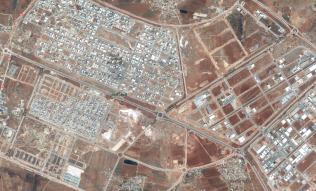
Satellite view of Sheikh-Najjar area
The repair works are currently concentrated in the Sheikh-Najjar district, where are a lot of factories, plants and power plants. The water and electricity supply of the whole Aleppo depends on the smooth functioning of the region. Moreover, the economic well-being of the city also depends on the working capacity of the Sheikh-Najjar, as the cotton production facilities are concentrated there.
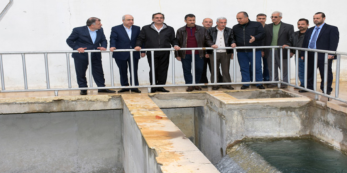
Hussain Diab inspects water pumping station[/caption]
Last week, Diab along with local entrepreneurs inspected the assessment of this area and drew up a plan of further restoration works. Also during this visit, the governor was shown a newly launched water pumping station and treatment facilities that provide the city with drinking water.
Despite the fact that the two-thirds of the railway tracks in Syria are destroyed due to hostilities, their restoration is also in full play. According to Najib Fares, head of Syrian railways, almost after a five-year break, the railway communication between Aleppo, Homs and Latakia provinces is restored.
Notably, since the beginning of 2017 more than 280 thousand Syrians have used rail transport.
[image error]
Restoration of railway communication
It also should be mentioned that, the pharmaceutical factory, which supplies Syrian medicines in more than 100 newly opened pharmacies in the city is reopened in Aleppo. Before the war, there were about 30 similar enterprises in the city.
[image error] Newly opened pharmacy in Aleppo[image error] People buying medicines
Most of restorations works take place in extremely difficult conditions, since Hayat Tahrir Al-Sham militants (ex Jabhat Al-Nusra) commit terrorist acts. Earlier this week, on August 7, a large explosion occurred inside the Tariq Bin Ziad base in Masaken Sabil area, 4 people were badly wounded.
Undoubtedly, the process of post-military restoration of Aleppo and the country as a whole will take place against the background of the international economic sanctions, which have been imposed by the U.S. and several European states.
Unfortunately, many European leaders do not understand that the imposed restrictions affect just ordinary people. Only by lifting the sanctions, having developed and accepting a joint post-war plan for the restoration of Syria, the Western countries can assist the Syrians, in rebuilding their destroyed homeland.
Sophie Mangal is the special investigative correspondent and co-editor of Inside Syria Media Center.


The Domestic and Global Shocks of the Growing Water Crisis in China
[image error]
China is plagued by a growing water security crisis and its current solutions are far from sufficient. The reverberations of this crisis have already had global implications, notably encouraging the Arab Spring. Further, as the crisis worsens, national, regional, and global political and economic instability will grow.
China has an age-old imbalance. Its agricultural core is in the North whilst its water resource is in the South. As of 2014, North China holds two-thirds of Chinese agriculture but only one fifth of its water. The rise of Mao in 1952 and an interventionist political ideology has cemented this chronic structural issue in the Chinese economy.
The Crisis Grows
Contemporary developments are further pressuring China’s water economy as rapid economic growth has sucked-in water. Agriculture and industry account for 85% of water usage. China has 20% of the world’s population but only 7% of its freshwater resource and a rapidly growing middle class with water-demanding lifestyles; the average hamburger takes 2400 liters to produce. In 2014, eleven out of thirty-one Chinese provinces did not meet the World Bank’s water needs criteria of 1500m3 per person; in 2015 in Beijing for example, water provisions amounted to only 100m3.
China’s artificially low pricing of water has encouraged poor water management by creating a disjuncture between actual and market water prices, promoting highly inefficient use in industry and agriculture, and persistent pollution of scarce freshwater supplies. A 2009 World Bank report stated that China was using ten times more water per unit of production than the average industrialized country and that pollution has made the water in 19% of main rivers and 35% of reservoirs useless for agriculture and industry.
Climate change exacerbates this situation. The meltwater from the Qinghai-Tibetan Plateau significantly feeds the Yangtze and Yellow Rivers; the Yangtze alone supports 584 million people and serves an economic zone that constitutes 42% of GDP. According to The State Laboratory of Cryospheric Sciences in China, run off into the Yangtze decreased by 13.9% during the 1990s.
Problem Solved?
China’s principal solution has been to commission the very high profile South-North Water Diversion Project, inspired by Chairman Mao. In 1952, Mao stated, “[The country’s] South has lots of water, the North has less, if it were possible, it could borrow a little”. The core of the project is a 1200 km canal stretching from the Yangtze to Beijing. It is a political showcase that is temporarily averting the crisis by addressing the symptoms rather than the cause, but at a cost of $62 billion, it is an expensive breather that will not resolve the problem.
By facilitating massive water transportation, China is reinforcing an artificial economy. It is encouraging water-intensive industry and agriculture and promoting a downward spiral of strengthening an insatiable demand whilst failing to combat system inefficiencies. Long term, this project, combined with state-induced low water prices, climate change, and population and economic growth, will perpetuate economic and water scarcity in Northern China. . .
Source: The Domestic and Global Shocks of the Growing Water Crisis in China


5 Best Off-Grid Currencies That Don’t Require Electricity
*
*
When zombies attack or when the electric grid is taken down by an EMP or solar flare, trade must go on. I would recommend adding dry firewood to this list.
When zombies attack or when the electric grid is taken down by an EMP or solar flare, trade must go on.
Currently, about 90% of U.S. dollars exist only digitally. Even if fiat cash remained valuable post-apocalypse, it would be pretty hard to come by.
Bitcoinand other cryptocurrencies are great, but still rely on electricity and the internet to function.
So what are the best off the grid currencies for a worst case scenario?
A currency stores the value of labor or goods that are otherwise hard to store, trade, and transport.
A Proper currency will not physically deteriorate over time. It will be widely useful, all the better if you can use it yourself, worst case scenario.
Here are the five best off the grid currencies to hoard, or have the means to create.
1. Distilled Spirits AKA Moonshine–Hard Freakin’ Alcohol!
We would never…
View original post 919 more words


US already had A Korean anti-nuke Peace Deal but Violated Every Single Clause
*
*
The US has arrogantly broken every single clause of this 1994 agreement.
U.S. signed a nuke deal with N Korea; then totally trashed it
Why the US’s 1994 deal with North Korea failed – and what Trump can learn from it
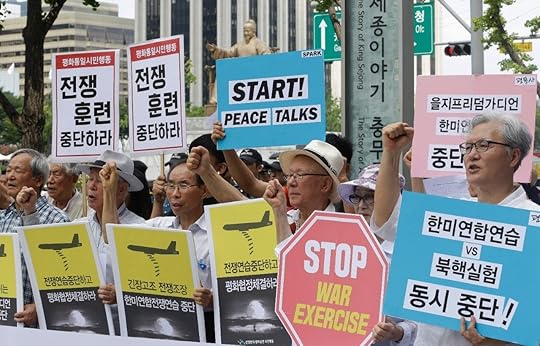
… by michaellee, shared with thanks If the Trump administration is to avoid spiralling into a nuclear confrontation with North Korea, it needs to understand what North Korea wants and why it behaves the way it does..
‘The North Korean leaders believe, with ample evidence, that they are in a desperate survival race against a rogue superpower which has destroyed a whole series of countries (recently Iraq, Libya, Yemen..) using its military power to try and reassert its dwindling economic hegemony’. The US has 28,500 troops in 11 US military bases in South Korea
… Under the terms of the 1994 framework, North Korea agreed to freeze and ultimately dismantle its nuclear programme in exchange for “the full…
View original post 685 more words


August 10, 2017
Let’s eat some insects!
*
*
Personally I prefer garden snails – they’re easier to catch and much tastier.
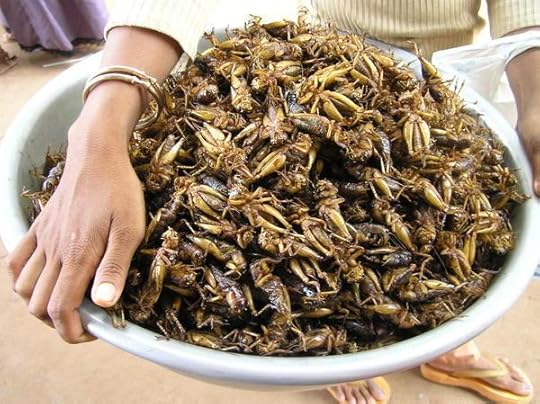
When I was at primary school in Madagascar, I had a game that I played with a friend of mine in the playground. We’d get thin canes, about six feet long, and go out into the long grass to look for grasshoppers. You couldn’t get close to them or they’d fly away, but if you crouched down and moved slowly you could get into range without them jumping. Then it was a matter of bringing the cane down fast enough and accurately enough to whack the insect.
It felt like a game to me, but this wasn’t gratuitous slaughter. We’d bag up our catch, and my friend would take the grasshoppers home with him at lunch time, and then bring them back fried and salted for an afternoon snack. This was normal for him, though the other children would tease him for it. Eating insects was a sign of poverty…
View original post 490 more words


Venezuela’s Constituent Assembly to Debate Economic Measures
*
*
The National Constituent Assembly in Venezuela will analyze the economic situation in the country, as it has already approved measures to respect and protect the legality of the state’s institution including the opposition-led National Assembly.
teleSUR | August 09, 2017
The members of the assembly will analyze tactics to overcome the economic situation in Venezuela.
The National Constituent Assembly in Venezuela will analyze the economic situation in the country, as it has already approved measures to respect and protect the legality of the state’s institution including the opposition-led National Assembly.
View original post 270 more words


The Most Revolutionary Act
- Stuart Jeanne Bramhall's profile
- 11 followers









